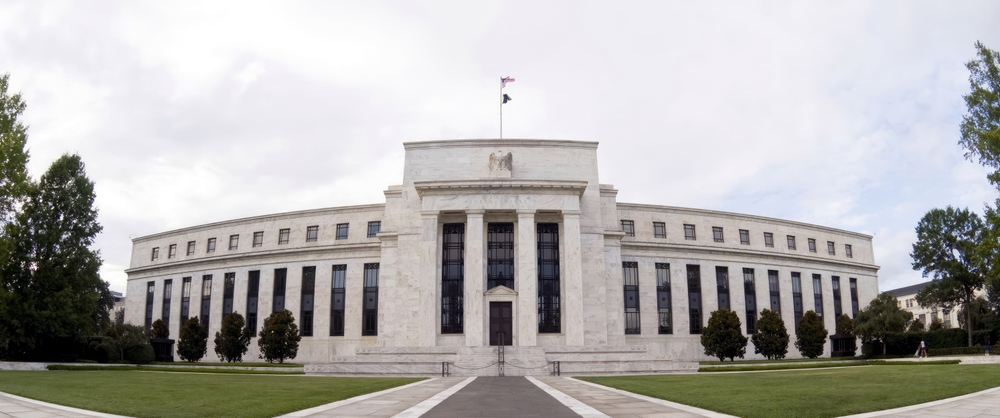
Why Reciprocal Trade Negotiations Will Fail
Only multilateral arrangements can foster growth and overcome irrelevant trade deficits.
The latest bulletins from the trade wars report Trump’s ultimate surrender in his ill-fated efforts to depose Federal Reserve Chairman Jerome Powell for his steadfast refusal to lower interest rates to offset the massive short-term costs from the Trump tariff program. Trump has long proclaimed that tariffs, basically discriminatory taxes on imports, are the greatest thing ever invented: “To me, the most beautiful word in the dictionary is ‘tariff.’” The relentless downward pressure in the capital markets exposes the utter folly of his aesthetic tastes. But an unrepentant and uneducated Trump continues to place his faith in reciprocal tariff negotiations. Trump now hopes to expedite these negotiations by offering approaches to broad categories of tariffs, quotas, and other non-tariff barriers in a series of proposed staggered negotiations, which is off to a rocky start, given that no one knows for sure whether negotiations have even begun with China.
It doesn’t matter. Trump should save his breath and quit while he is behind, because any such system is bound to fail, whether his administration can reach some bilateral agreements or not. The questionable skills of Trump as a negotiator are not an issue. Nor is it that reciprocal agreements are intrinsically undesirable. Rather, in the vast number of cases, these two-party deals only increase the losses on both sides of the table. The World Trade Organization offers better prospects: “At the heart of the system – known as the multilateral trading system – are the WTO’s agreements, negotiated and signed by a large majority of the world’s trading economies, and ratified in their parliaments.”
Why so? Reciprocal trade agreements are doomed mainly because the division of labor creates huge gains through specialization. Start with the homely example of two traders in a domestic market. The seller (S) makes widgets that the buyer (B) purchases. But, as is common in various supply chains, B makes nothing of interest to S. At this point, note the two parallel trends. First, as the number of trades goes up, the joint gains of the parties increase because these trades create gains for both sides that increase monotonically with volume. Next, the same increase happens with the trade deficit, as S gets the cash that B pays, while B gets no cash. Hence, the deficits rise with that increase in volume. Within the national system, the president and his supporters dare not claim that company B is being ripped off. Now put S and B in different nations. How can Trump claim, as he does in his “Fact Sheet,” that this separation creates an emergency if S is outside the U.S. and B is within it.
Large and persistent annual U.S. goods trade deficits have led to the hollowing out of our manufacturing base; resulted in a lack of incentive to increase advanced domestic manufacturing capacity; undermined critical supply chains; and rendered our defense-industrial base dependent on foreign adversaries.
He then gets matters exactly backwards in “invoking his authority under the International Emergency Economic Powers Act of 1977 (IEEPA),”—which confers no such power—“to address the national emergency posed by the large and persistent trade deficit that is driven by the absence of reciprocity in our trade relationships.”
Utter nonsense. In the above example, the high trade deficits from asymmetrical dealings are still associated with high gains for both parties to the transaction. The deficits are a side effect of no economic consequence once we put these transactions in a wider global context. Thus, S must acquire his inputs from somewhere. Commonly, the critical supply chains to which Trump refers occur across multiple countries, which means that the focus on reciprocal transactions is misplaced. Thus, suppose now that country X delivers goods for S but buys nothing in exchange from S, and similarly that country Z buys goods from country B, and sells nothing to B in return. All these transactions are positive sum, so that the increase in world wealth attributable to this extreme specialization continues to be positive and will increase even more if existing trade barriers are lowered further. At the same time, however, the apparent imbalance in trade deficits is reduced. S’s huge trade surplus with B is offset by its deficit with X, and B’s huge trade deficits with S are offset by the receipts from his sales to X. These four-nation calculations are the tip of the iceberg because the patterns of international trade are so complex that national trade deficits and surpluses come and go with increased trade, which is why the WTO prefers multinational deals. In contrast, the overall productive levels continue regardless of the trade deficit with any given country. Thus, the United States exploits other nations to which it sells more goods than it buys. And nothing but further gains are relevant if B now sells to S, who buys from B. The absence of trade reciprocity is only a sign of a “fake” emergency. Rather, international and domestic specialization is an accurate sign of robust health.
Trump is thus doomed to fail to speed up reciprocal negotiations to cut through the current trade morass. So, return to the simple situation in which bilateral deals must lead to lower tariffs. By definition, we buy more from nation X than it buys from us, so what happens next? It is no solution for the United States to sell to nation X goods at high prices that it could buy more cheaply from third parties. It will be very hard to balance out the accounts if they reduce tariffs on the tiny supply of goods they buy from us, if we have to make concessions that cut our tariffs by far larger amounts. The internal players in each country will resist the loss of their tariff protection and not care one whit about tariffs on unrelated goods. So there will now have to be preliminary negotiations inside each nation before seeking that elusive reciprocal deal. These predictable internal animosities will make it more difficult for our defense-industrial base to make, as Trump wishes, sensible deals with our allies, which means that our “foreign adversaries” will take comfort in our relative economic weakness, which is what to expect when the U.S. disrupts worldwide supply chains for no reason at all.
But what, we may say, about the high tariffs of other nations? There is no question that these tariffs also disrupt world trade. But what is less often observed is that these tariffs also wreck the economies of the countries that impose them on their businesses and people. The gains to local producers are swamped by the loss to local consumers. As Steve Chapman has sadly noted, the American history of tariffs shows that a tariff on washing machines saved about 1,800 jobs at a cost of about $817,000 per job. The figures will be about the same for any stagnant nation—think of the entire European Union—that imitates the same strategy, which it then makes worse by providing ill-advised subsidies to its exports. The internal waste from both strategies is further compounded because high tariffs reduce local exporters' ability to obtain needed inputs at favorable prices, further depressing the local economy. That decline gives an implicit boost to American manufacturers who, contrary to the bogus Trump narrative, are not “hollowed out” but producing at high levels of efficiency.
At this point, the best thing to do is not to follow the same road to oblivion as our ill-advised trading partners. It is instead to do nothing collectively. Let domestic industries reorient their business practices to take advantage of those subsidies, further reducing the costs of selling American goods in foreign markets. Let stockholders diversify their portfolios to reflect the foolish policy choices of foreign nations. But the one thing not to do is to get sucked into bilateral negotiations which can never provide sensible solutions that reflect the complex and specialized supply chains that breed a crazy-quilt pattern of trade deficits.
The problem here was well understood in ancient times. Justinian’s Digest’s treatment of the law of sales begins Book XVIII with the statement that sale arose out of barter because the interposition of money meant that every pair of traders, A and B, was locked into a bilateral monopoly in which they could only transfer goods to a second who did not have the right quantity of stuff that they wanted to acquire in exchange—a real bummer. What money did was to allow A to sell to X for cash, and B to sell to Z for cash. A could then use money to buy from B, while B could sell his goods elsewhere to some third party. The enormous gains to trade from the interposition of cash benefited everyone, and the Romans excelled by exploiting a tremendously sophisticated distribution chain lubricated by cash, which also generated the same pattern of trade deficits and wealth creation. By analogy, Trump’s insistence on bilateral negotiation makes as much sense today as it would have made for the Romans to junk cash and return exclusively to barter. So his scripted negotiations are doomed to failure, whether they produce some inefficient deal or no deal at all. The man who thinks “tariff” is the most beautiful word in English should relinquish his crackpot ideas.
Richard A. Epstein is a senior research fellow at the Civitas Institute. He is also the inaugural Laurence A. Tisch Professor of Law at NYU School of Law, where he serves as a Director of the Classical Liberal Institute, which he helped found in 2013. He has served as the Peter and Kirstin Bedford Senior Fellow (adjunct) at the Hoover Institution since 2000. Epstein is also the James Parker Hall Distinguished Service Professor of Law Emeritus and a senior lecturer at the University of Chicago.
Economic Dynamism
.jpg)
Do Dynamic Societies Leave Workers Behind Culturally?
Technological change is undoubtedly raising profound metaphysical questions, and thinking clearly about them may be more consequential than ever.

The War on Disruption
The only way we can challenge stagnation is by attacking the underlying narratives. What today’s societies need is a celebration of messiness.

Unlocking Public Value: A Proposal for AI Opportunity Zones
Governments often regulate AI’s risks without measuring its rewards—AI Opportunity Zones would flip the script by granting public institutions open access to advanced systems in exchange for transparent, real-world testing that proves their value on society’s toughest challenges.

Downtowns are dying, but we know how to save them
Even those who yearn to visit or live in a walkable, dense neighborhood are not going to flock to a place surrounded by a grim urban dystopia.

The Housing Crisis
Soaring housing costs are driving young people towards socialism—only dispersed development and expanded property ownership can preserve liberal democracy.

The Start-Up Paradox: The Coming Red Shift in Innovation
Despite London's success, the future of innovation is securely in American hands for the foreseeable future.

Oren Cass's Bad Timing
Cass’s critique misses the most telling point about today’s economy: U.S. companies are on top because they consistently outcompete their global rivals.
.avif)


.jpeg)




.jpg)





